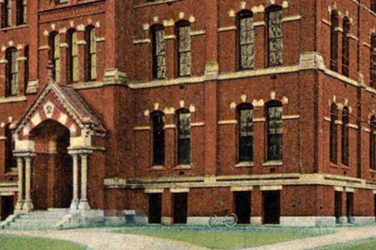Back when life was all about hunting elk and running from bears, an earthy cave was the perfect safe-space: you could go to just shut it all out, and relax. However, with the descent of humans into consumerism, most cave-dwellers abandoned their primitive lifestyles, preferring instead to hunt through IKEA catalogues. Nevertheless, it is well known in the fashion world that ‘what goes around comes around’ – so maybe it is therefore not surprising to find out that living in a cave without electricity is now à la mode in the south-Spanish region of Andalusia.
Anyone can make a cave theirs if they want. You just have to buy a door with a padlock then stick it in the entrance hole, and it’s yours.
For Andalusian locals, cave-dwelling is nothing new – for many centuries the caves gave refuge to Romani and other racially or religiously persecuted groups. For tourists on the other hand, the recently sprung market for cave-dining, cave-BnB-ing and even cave-clubbing are the hottest thing right now at #beinghipsterinAndalusia. But behind the shadows cast by the large hands of TripAdvisor and Hostelworld lurks a darker reality of the life of the modern-day cave-dwellers – one that reflects Andalusia’s 40% unemployment rate.

Alfonso* began cave-dwelling in Spain as a young immigrant from Chile, too broke to pay rent but full of ambition. 25 years on, and Alfonso is stuck between rocks – still without enough money to pay rent, nor enough to buy a plane ticket back to Chile. “Every night I knit hats. Every day I leave my cave and go to the town to sell my hats. I want to go back to Chile and see my family, but the ticket is very expensive and I only get €5 a hat.”

Alfonso is one of the 5800 cave-dwellers with official papers allowing him to legally own his cave.(1) There may however be many other cave-dwellers living off the record. According to on-the-run drug-trafficker Bourg* from Sweden, illegal cave-dwelling is actually pretty easy: “Anyone can make a cave theirs if they want. You just have to buy a door with a padlock then stick it in the entrance hole, and it’s yours.” But like Alfonso, Bourg is trapped; chained to his kingdom of caves: “I can’t go back to Sweden, the police know me there and I have too many enemies.”

It is the mountainous, less habitable regions on the outskirts of town where most of the undocumented migrants live. This is where Caleb*, a young immigrant from Senegal, has found himself a home and a community: “When I came here from Africa by boat I had nothing, I only knew that my brother was here. Now there is a large Senegalese community, we help each other out.” But whilst Caleb has made a good life here, he still sees it as a temporary accommodation: “We have made life here better but it is not easy – there is a lot of us in a small space. I am doing a course now to become a fisherman. I will earn a lot more money this way, so I can move into my own place.”
For the first time in 36 years, Andalusia’s December election saw the winning of seats on the far-right, a turn which is thought to be due to rising anti-immigration sentiment amongst local Andalusians. Rumours are circulating that the police are gathering forces to rid the caves of migrants.

“There have been police raids in the past, but not for many years.” “There are always rumours. But there’s too many international people here now. The police don’t dare kick us out, it will cause too many diplomatic problems!”. What Caleb is referring to is a burgeoning population of the cave-dwelling middle class. The Italian philosophy major, the solo-female Japanese artist, the retired British women from Essex; Andalusia, it turns out, is a hot spot for happy-go-lucky hippies. And with their high-connections and diplomatic influence, these globe-trotting bohemians may unwittingly be the peacekeepers, guarding their neighbours from eviction.
In the meantime, migrants living in Andalusia will continue to be forced to live in mountain caves, hoping that the stewing nationalist sentiment in the towns below doesn’t spill over.
Cover Photo courtesy: Jennifer Gunther





